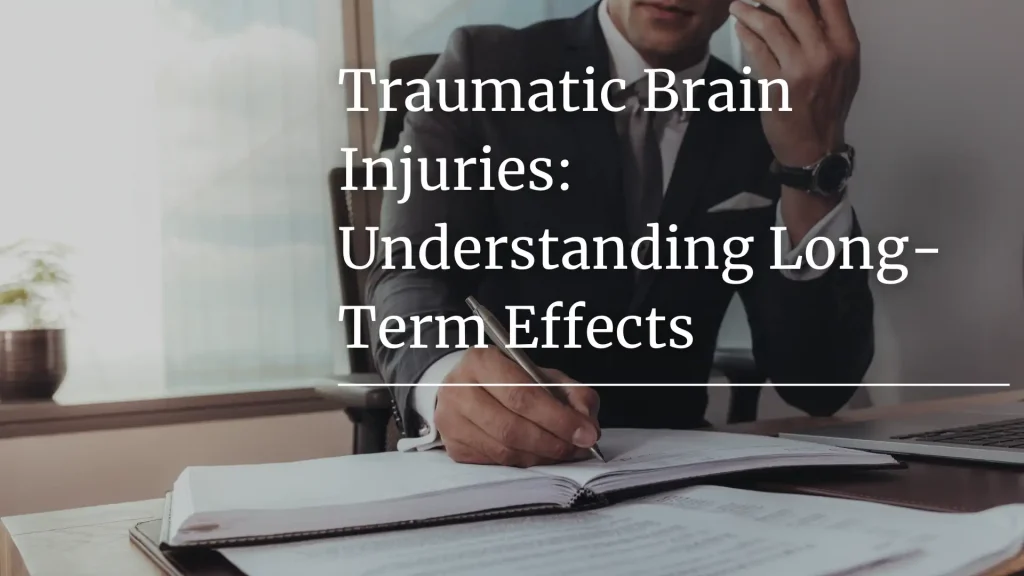Posted on Monday, July 15th, 2024 at 9:00 am

Traumatic brain injuries are among the most devastating injuries a person can suffer. These injuries can result in long-term or permanent physical and cognitive disability, as well as psychological trauma.
If you or a loved one suffered a traumatic brain injury caused by someone else, a Chicago personal injury lawyer can explain how you can pursue compensation and the best options for seeking compensation.
What Is a Traumatic Brain Injury?
A traumatic brain injury (TBI) occurs when the brain suffers damage due to a blunt or penetrative force to the head. They can result from falls, sports injuries, motor vehicle accidents, and violent physical assaults, among other incidents.
On the mild end of the traumatic brain injury spectrum are concussions. A single concussion may cause dizziness, nausea, and mental fogginess. In addition, repeat concussions can lead to more severe symptoms that develop over time. On the other end of the spectrum, a severe traumatic brain injury can result in complete paralysis, extreme cognitive decline, and even death.
Effects of Traumatic Brain Injuries
The effects of a traumatic brain injury can vary greatly. The type of incident that caused the injury and the parts of the brain affected by the injury play a significant role in the symptoms that manifest. Some of these symptoms include:
- Headaches and Migraines – Persistent headaches and frequent migraines are frequent symptoms of traumatic brain injuries.
- Motor Skill Impairment – A traumatic brain injury can significantly impact coordination, balance, and fine motor skills.
- Seizures – Some individuals may develop epilepsy after a traumatic brain injury.
- Chronic Pain – Persistent neck and back pain is sometimes a symptom if the injury occurs at the base of the head.
- Memory Loss – A traumatic brain injury can cause short-term or long-term memory loss.
- Difficulty Concentrating – Individuals who suffer a traumatic brain injury often experience difficulty focusing.
- Executive Dysfunction – Traumatic brain injuries can damage the part of the brain responsible for planning, decision-making, and problem-solving.
- Mood Swings – Some victims of traumatic brain injuries suffer from unpredictable mood changes.
- Depression and Anxiety – Any severe injury can lead to mental health issues like depression and anxiety, but these symptoms can be heightened in a traumatic brain injury victim.
- Irritability and Aggression – In some cases, victims can become irritable and aggressive after their brain injury.
The Impact of Brain Injuries on Quality of Life
Brain injuries can impact your quality of life in various ways due to the physical, cognitive, and emotional damage they do. Some ways your injury may affect your quality of life include:
- Daily Activities – Your physical injuries may make it difficult or impossible to complete everyday activities on your own, including cooking, cleaning, bathing, and getting dressed. You may require the assistance of a family member or aid to perform previously routine activities.
- Relationships – Traumatic brain injuries can strain personal relationships in several ways. Changes in mood and behavior can lead to the breakdown of friendships. Transitioning from spouse, parent, or child to full-time caretaker can add stress. Further, anxiety and depression can cause the victim to retreat from public settings and become isolated.
- Career and Financial Stability – Long-term and permanent traumatic brain injuries can lead to the loss of employment or the inability to work. Even if the injured person can work, it will likely be in a reduced capacity for reduced pay.
- Mental Health – After a severe injury, individuals can become isolated and struggle with depression. Without the proper support structure, their mental health can spiral, further reducing their quality of life.
Legal Claims for Brain Injury Compensation
Personal injury lawsuits are a means by which someone who suffered a brain injury can receive compensation for their injuries. The money you get from your injury claim can cover your medical expenses, lost wages, and more.
Compensable economic (tangible) and non-economic (intangible) losses suffered by the victim include:
- Medical Expenses – You can seek compensation for your past and future medical expenses. You can include hospital stays, surgeries, prescription medications, medical treatments, and physical therapy. Your attorney can calculate your future medical expenses based on your protected treatment plan and age.
- Lost Wages – Since a traumatic brain injury will likely impact your ability to work, you can seek compensation for the wages you’ve lost. These lost wages include the wages you’ve already lost, your future loss of earning potential, and even the benefits you lost due to being out of work, such as healthcare and retirement.
- Pain and Suffering – The physical pain and suffering you experienced due to your injury is a non-economic loss for which your experienced attorney can determine a value.
- Loss of Consortium – If you are married, your spouse can seek compensation for loss of consortium, which is the loss of a spousal relationship.
Support for Traumatic Brain Injury Victims

Support for traumatic brain injury victims takes a few forms, including ongoing medical treatment and rehabilitation, support groups, mental health services, and legal assistance.
Medical treatment and rehabilitation can help the injured person recover to a certain extent and improve their quality of life. After rehabilitation, a victim may see improvements in their motor skills.
Support groups and mental health services can be vital for helping people with brain injuries cope with their new lives. They may not be able to participate in activities they once enjoyed, and having others to talk through their experience with can help them come to terms with that.
An attorney can assist an injured person and their family in recovering the compensation necessary to pay off their medical bills and to make up for their lost wages.
Get the Help You Need from a Chicago Brain Injury Accident Attorney
Have you suffered a traumatic brain injury due to the negligent actions or wrongdoing of someone else? Call Wallace Miller at (312) 261-6193 or contact us online for a free consultation with one of our experienced personal injury attorneys.
We’ll evaluate your case, explain your legal options, and gather the documents and other evidence necessary to file your compensation claim. When you hire us, you don’t have to do anything. We’ll take on your case and do all the work for you.
